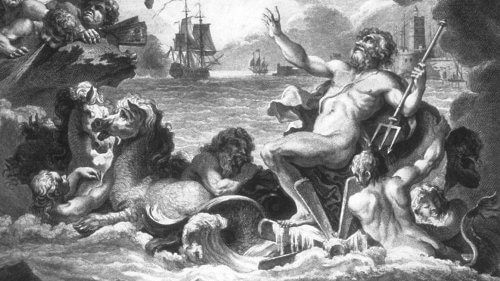

Oil companies carefully cultivated the brand loyalty of motorists by offering them a number of services. For a brief period in the 1930s, several oil companies posted maps at their stations - in special installations - displaying weekly updates of ro...

The motor car . . . alluring and fascinating in its magic powers of carrying us so quickly in the wake of our wishes . . . the typical recreation of a restless age. A. B. Filson Young, The Complete Motorist, 1905. From its beginnings, automobile art ...

This website was designed and prepared, from Donald Johnson's text, by Matthew Edney with the assistance of Tami Christopher and Daryl Sasser.Exhibition Proper: OML Curator's CommentsWith Charting Neptune's Realm, the staff of the Osher Map Library h...

Contrary to what one might expect after centuries of exploration, the charting of Neptune's Realm is not complete. It is still an ongoing process; indeed, there is an explosion in the amount and kind of new information now available. Up until the mid...

Until the beginning of the sixteenth century, navigators had scant need to fix their precise position by latitude and longitude. Voyages were short and principally followed the coast; ships were rarely out of sight of land for more than a few hours' ...

As voyaging increased into the uncharted regions of the open ocean, mariners brought back their findings to be retained in written records and represented on maps. To create accurate maps cartographers needed more than recounted tales and estimated d...

In navigating long distances, the compass was as important an instrument for indicating direction as the sand-glass was for marking time. The compass was developed in China around AD 1100, and independently in northern Europe shortly thereafter. By t...

During the great Age of Discovery as mariners began to traverse the Atlantic, and were beyond the sight of land, many fears beset them. They believed that grotesque monsters lay in wait: giant squid would crush their ships in its powerful tentacles, ...

In the sixteenth, and well into the seventeenth century, the course of ocean currents was virtually unknown. But as European ships left the familiar shores of continental Europe and their trade routes in the Mediterranean to venture out into the Sea ...

King Aeolus, lord of wind and cloud, ruler of contending winds and moaning gales, controlled their fury lest they flay the sea into a great uproar. So great was his power, that Agamemnon, leader of the Greek expedition to destroy Troy, sacrificed his...